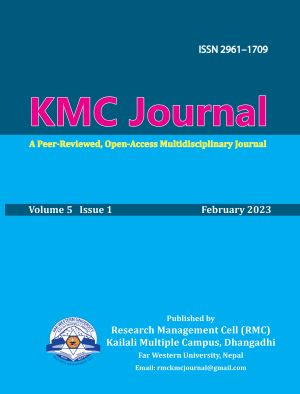Teacher Identity and Hierarchy: Narrative Inquiry of Primary Teachers in Nepal’s Public Schools
DOI:
https://doi.org/10.3126/kmcj.v5i1.52447Keywords:
Professional hierarchy, community school, motivation, teacher education, institutional identityAbstract
The article explores how Nepalese public schools’ traditional hierarchy-dominated educational culture shapes teachers’ professional growth and sense of identity. Through the narrative inquiry approach, I explored teachers' professional identity development using Gee’s (2000) identity framework. The data revealed that hierarchy and power relations between the teachers and the social context fundamentally shaped teacher identity development. However, the study further showed that professional hierarchy was not uni-layered, the power was not one-directional, and the domination was not permanent but rather dynamic. Factors like academic qualifications, job status, technological skills, and social status made the hierarchy complex. More interestingly, hierarchical relationships did not always undermine teacher empowerment but confidence in some cases. For example, when a teacher in a marginalized position due to some factors such as poor health condition was viewed as a role model or capable of success despite challenges, they achieved high value from their colleagues.
Downloads
Downloads
Published
How to Cite
Issue
Section
License
Copyright (c) 2023 Khim Raj Subedi

This work is licensed under a Creative Commons Attribution-NonCommercial 4.0 International License.
This license allows reusers to distribute, remix, adapt, and build upon the material in any medium or format for noncommercial purposes only, and only so long as attribution is given to the creator.




